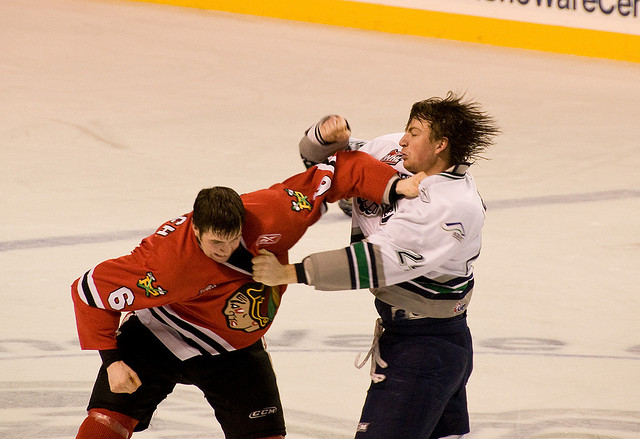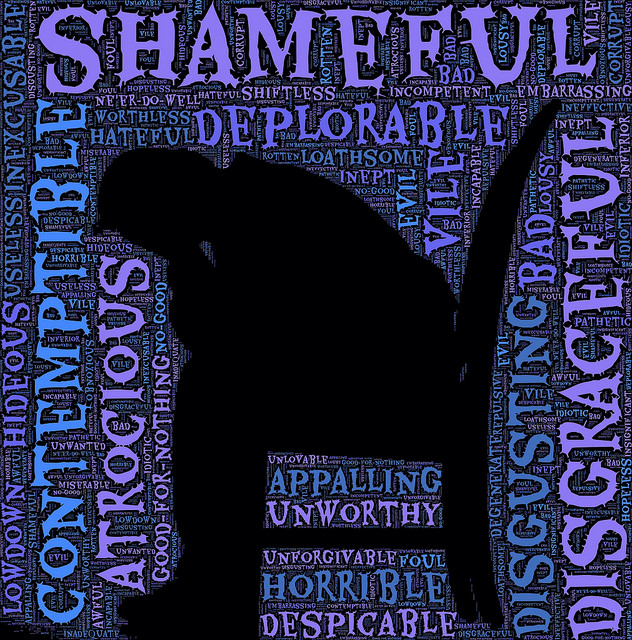10 Most Common Swear Words and Expressions in Arabic Posted by jesa on Jan 20, 2015 in Arabic Language, Culture
Marhaba! You all know by now that our posts are PG rated and we’ve never ventured into a discussion of Arabic curses and swear words. Well, we’ve discussed several ways to express anger in Arabic, but I am pretty sure some of you are interested in learning some of the most common swear words in Arabic. It is another side of any language. My apologies to those who might be uninterested in learning these swear words, but I was inspired by the fact that most of my friends always ask me to teach them to swear in Arabic, because they’ve heard that we can get pretty creative. Another source of inspiration for this post comes from a colleague at the Transparent Chinese blog. I want to thank Sasha for really reminding me that most new language learners “seek out profanity when learning a new language,” and that creativity in swear words cuts across languages lines and at most times revolve around similar themes.
Most swear words in Arabic are either family or sex related. Other swear words or insults are just based on general gruesome things, such as feces or something similar. As always a word of caution is in order: be careful how and when you use any of these swear words. You never know how things might unravel after you’ve uttered one of these powerful and profane words.
Family Related
You can realize from the post on expressing anger in Arabic that venting off usually involves bashing the person’s family (العائلة), specifically the parents (الأهل) or siblings (الإخوة). Most insults and Arabic swear words and expressions center on this important fact and in some instances combine parents and siblings in one curse or insult.
1) Kess Ikhtak Pronounced as: KISS EKH-TAK
This is the common equivalent of “f*** your sister” or “damn it,” when a person is pretty annoying or partly before two get in a fistfight. It literally means “your sister’s vagina.” This pretty much bashes the person’s ‘honor’ (شرف) because you’re referring to his sister’s genitals.
2) Kess Ommak Pronounced as: KISS OM-MAK
This builds on the previous insult, but this literally means “your mom’s vagina.” This is the common equivalent of “f*** your mom.” This is an escalation from the sister insult because in some instances an individual might not have a sister (أخت) but definitely has a mother (أم).
3) Ya Ibn el Sharmouta Pronounced as: YA EBEN AL SHAR-MOO-TA
It literally means “son of a bitch,” and is used to bash both the individual and his mother.
Sex Related
Many swear words in Arabic center on genitals, sex, prostitution etc.
4) Ayreh Feek Pronounced as: AY-REE FEE-K
This is the common equivalent of “fuck you” or “screw you.” This is a common expression between friends or prior to a gruesome fistfight. It literally means “my penis in you.”
5) Telhas Teeze Pronounced as: TEL-HAS TEE-ZEE
This is the common equivalent of “kiss my ass.” This literally means “lick my ass,” and is also used between friends or when someone is trying to mock or belittle another person in the group.
6) Ya Sharmouta Pronounced as: YA SHAR-MOO-TA
This literally means “you bitch,” and is supposedly uttered to bash someone in the group or simply to demean someone.
Misc. Related
These are swear words from common animal names and such.
7) Ya Kalb Pronounced as: YA KA-LIB
This literally means “you dog,” and is uttered to degrade someone as being filthy, dishonest, or immoral.
8) Tozz Feek Pronounced as: TOZ FEEK
This literally means “screw you,” and is used to vent off against someone annoying.
9) Kol Khara Pronounced as: KOL KHA-RA
This literally means “eat shit,” and is used to shut up someone who goes on and on about trivial issues.
10) Ya Khara Pronounced as: YA KHA-RA
This literally means “you shit,” and is used to demean someone. It could be used between friends or before getting into a fight with someone. This is usually a lower end curse.
This list could go on and on and does encompass different dialects. Again, be careful when, why, and how to use them. Any of these could get you into serious trouble. Use them wisely and tread lightly. Take it easy!

Build vocabulary, practice pronunciation, and more with Transparent Language Online. Available anytime, anywhere, on any device.
About the Author: jesa
Salam everyone! Born as an American to two originally Arab parents, I have been raised and have spent most of my life in Beirut, Lebanon. I have lived my good times and my bad times in Beirut. I was but a young child when I had to learn to share my toys and food with others as we hid from bombs and fighting during the Lebanese Civil War. I feel my connection to Arabic as both a language and culture is severing and so it is with you, my readers and fellow Arabic lovers, and through you that I wish to reestablish this connection by creating one for you.








Comments:
Eva:
This is an interesting post. I’m learning Arabic, and I don’t think I’m going to use these words. But it is interesting to understand the meaning anyway. Thanks!
Placeholder:
@Eva these swears are also used in israel, if you plan to go there 🙂
Eddie Fatoush:
@Eva If you don’t use these words, then you aren’t truly speaking Arabic!
Yannis Haralambous:
Related to the first two insults you described, here is a true story that happened to the cousin of a good friend of mine. She was working at Olympic Airways, and was sent to some country of the Persian Gulf to work at Olympic Airway’s offices there. A week later she was back from that country. The reason? Her family name is Κοσσιφίδου, which is pronounced KOSS-IF-ITHOU… I guess you know what this means in Arabic.
And what can I say about my own family name Χαραλάμπους which is pronounced KHARA-LAMBOUS, the first part of it appears in some of your examples above…
Miles:
My Syrian friends were nice enough to teach me inappropriate phrases
بدك نَيْكْ بِعَصاية كْرَيْكْ
Bidek nake bi-Asyut krake
You need a F-ing with a shovel handle
اشْرَف واحد منهُن عَرْصة
Ashrof waHad min-hon ArSah
The best one among them is a fucker
انت جاجة، أنا ديك، انت طوبز، أنا نيك
Intay jajay, ana deek, intay Tow-biz, Ana neek
You’re the hen, I’m the rooster, you bend over, I fuck
Good times
Evana:
@Miles I found the last one so catchy I can’t stop saying it xD
jesa:
@Evana Salam, that’s good! But please use any of these words with caution 🙂
Adrien:
@Evana that is funny! it rhymes!
None:
@Adrien It’s great you people come together and share.
Your sensitivity though is mind boggling and seems to be your major focus.
Any person smart enough to be trying to learn dialects or a second or fifth language knows when to say fuck etc.
You people harp on: oh be careful.
Why? I know lebs, Serbs, Jews, Muslims, Egyptians, Indians, Jordanians, Asians, Palestinian, Pakistan, not once has my rude interpretation of trying to learn their languages has it ever been a problem.
Say what you would say as in your native language and don’t be afraid to offend. You full of shit, if your talking to anyone with a brain they know your fucking it up but trying, you guys are telling people to be carefull for no reason. You have to be more careful in English as a English speaking person or French than you to Arabic.!… And how about actually teaching something instead of talking about it or the pit falls. How about mention grammar, pro nouns, female and male. Dialects.
It’s pretty diverse.
Blah… I guess you trolled me but your all so involved in a one track mind set it sucks.
Art Browning:
This reminds me of a long time ago, back in 1977, when my friend and I were talking Arabic classes in Tripoli, Libya. (There were several young Palestinian ladies in the class; they knew Arabic, but a different dialect, and were auditing the class to get up to speed with the Libyan dialect.) We were several weeks into the class and were practicing sentence construction. The exercise given to us was to say what kind of sandwich we like. My friend want to say he likes bread and butter, so he said, “Uhibbu khubs wa zib” when he should have said “zibda” for butter: أنا أحب الخبز والزبدة. The girls snickered and tittered. When we got home, we asked a Libyan friend why, and he told us that “zib” is slang for penis.
jesa:
@Art Browning Salam Art. A very interesting and funny story!! thanks for sharing. It happens to most new Arabic learners, but in any case, I always ask all new learners to use these curse and swear words with utmost caution.
Lu,ay:
Hi
thank you for this valuable information, but I think we can not use these swearwords in our research papers. For me as MA student this is an unacceptable to use such words in my thesis I asked to avoid cussing and cursing.
jesa:
@Lu,ay Salam! I totally agree. These are not to be used in academic work or any other work. It’s a form of cultural expression, although in an impolite manner.
JATIN:
THANKS VERY USEFUL WORDS FOR PERSON LIKE ME WHO DOES NOT ARABIC.
jesa:
@JATIN You’re welcome Jatin. But please careful when you use them. 🙂
faiez:
@jesa Hy jesa…..I just want to know that how can I learn arabic language ……..I mean that I live in india so it is really difficult to learn arabic because no one speak arabic in india so how we learn arabic language fully not just2 to 8 words……..full arabic
VICTORIA:
As i was searching curses in arabic and found this one. My husband is a lebanese and im not. We were crazy that one day we talked to each other cursing in arabic while me of course i only know 2 or 3 curses in arabic.. Now i got more 7 curses to throw at him..so basically were just messin up with each other no harmful intended.
jesa:
@VICTORIA Hehehhe Victoria!! please please use them with caution or simply avoid using them 🙂
John A:
I grew up in a Syrian centered family in an Arab neighborhood in Brooklyn NY. Many years ago (1960’s) I worked as a cash register clerk in an A&P store. An older Arab woman cut the line to the cash register and I asked her to go to the back of the line. She responded “telhas bukshee” (lick my asshole) to which I replied “inti telahsi lahalek!”…..go lick it your self. She was so embarrassed that she left the line and disappeared back into the store. I don’t know that she ever left!
jesa:
@John A Very interesting story John. thanks for sharing 🙂
Stephanie:
I like these words, however, my husband is NOT keen with me learning the curse words. Now, I can talk to his family when they want to argue with me.
jesa:
@Stephanie Hahaha sounds goods Stephanie! but please please use them with caution or just try to avoid using them 🙂
Della:
@jesa My husband wanted me to say neckni –and huwanee too, I had thought neckni was a sweeter love phrase. What does huwanee mean?
kalish:
My Grandfather was from Syria/Lebanon, so I know some of these words, a cop was being
a real jerk after giving me a ticket, so when he was done before I left, I said Telhas Teeze !
he said “whats that mean” I said, “it means have a good day” hahaha
susu:
What kind of Arabic is this? Or it can be used in all Arabic speaking countries?
Al:
funny story, I was insulted kus umuk in a mini bus in Cairo, I was studying Arabic Fusha so I had no idea what it meant. I tried explaining myself in Fusha and English but the guy was really pissed. I later asked a friend the meaning and I haven’t forgotten since. Lol
Jacob smith:
Ya hamar=you jackass your welcome but be careful using these words
Theo:
Is it true that in Egypt they use Kuss Ummak whereas in Syria, Lebanon, Jordan, Palestine they use Kiss Ekhtak? I lived several years in the Levant and never heard Kuss Ummak – always Kiss Ikhtak. I visited Egypt a lot and never heard Kiss Ikhtak, always Kuss Ummak.
Gino Racanelli:
I always get called a donkey in Lebanese and I love that word.It’so been my nickname when I play for my soccer club.You can call me this if you like. Lol.
Maha:
I’m Lebanese and I sent these to my american friend, she keeps using them on me and it’s so funny wallah thank you she needed the explanation lol
LIDHIN K:
Jesa really thank u.. Im working in qatar as an accountant in a supermarket.. So allmost days there will be a problem with customers.. So i think i should learn these.. Because they people mostly using these worda.. Now i know the meaning.. I can reply to them….
thanks:
Thanks, i can now try to listen for when my super rude arabic speaking neighbors are talking smack, and respond with an insult to his mother!
chennag:
You must defferenciate between dialect arabic ,arabic language and (the difference ) between dialect arabic in every arabic country .After doing that you will be able to write an amazing and complete article about ‘curses and swear words’ in arabic world without forgetting dialect arabic ,arabic language .If you need some swear words of Morocco i will be at your disposal for any further information.
Ray:
I was adapted by Lebanese. I’m a white boy or American. I love the language and the cuisine. I still remember some of the language. My grandma used to cuss at us when we were little brats in Arabic. But in spite of everything said and done she was a fine person. I like your post. Learning new and old words. Thanks
Hoda:
It is important to say at the beginning of the post that:
1-This is informal Arabic. There’s no problem with informal Arabic, but it is important for people to understand that this is not the language that the Prophet used to speak with, and the people after him great scholars and so.
2- Which accent or country this Arabic is from. Because, as an Egyptian, I do know that every Arab country has its accents and culture. like, there’s a Syrian word for saying “woman”, which, if used here in Egypt, would be an extremely horrible insult.
btw even though I am 100% Arab, i like reading posts like yours 😀
Hoda:
I’m not really 100& Arab. I was born in the US, and then my family returned to Egypt when i was 6. But i do like connecting both languages together, and seeing people gathered around the language i am proud of fills me with happiness, especially because Arabic is not international. i’d like to hear more about the reasons why non-Arabs learn Arabic. It is quite interesting.
Hoda:
Art Browning’s comment kinda explains a part of my opinion 😉
Ramaz:
I lived in Algeria for 4 years with my family when I was 7-11 years old.
One of the locals, who I befriended, taught me some inappropriate insults in Arabic. I am not sure if I remember them correctly, but they sounded something like this:
Nadin Babak
Nachun Emmak
I am not sure what they mean, but I guess the the first one is related to father and the second one to mother.
One day, I got so mad at one of the guys who I was playing with, that I told him one of these. Man! It was followed by a very serious row. His parents even came to our house to demand apology from my parents. We all had to apologize a hundred times.
And I was only about 8 years old.
So, be very careful with these phrases and never use them.
A:
Thanks for these. Many people learning foreign languages want to know this type of language, whether to use or to avoid. NOT PROVIDING this information just makes us look, and it’s nice to have a reputable (hehe) source. I doubt you have to tell adults to curse responsibly. We know when we choose to use profanity in our native languages, and we should be allowed to choose when we want to use it in any other tongue.
Sasha:
Ahhh I love Lebanon and everything to do with it. Originally America-Egyptian, but growing up in the US, and Dubai, lost touch with my mom’s background and can barely speak 🙁 Any tips? How to get started again?
wonhoe:
hey im arabic and i live in riyahd for like my hole life so i came here bc i was bored the words are very real i even used them in a daily based and there is زق ZAG that literally means shit i hope to every one who wants to learn arabic please keep going its a beautiful language all he best boi
Nůzha:
Salam Jesa…I came across your blog by chance and have to say you have made my day…This is the stuff i grew up with and these are the first words i heard and learnt from babyhood – dad the Egyptian always swearing and cursing in Arabic..Needless to say my mum the prim and proper English lady the complete opposite …Thank you for being so literal and so real…From Downunder Sydney
Hal:
I think it’s important to learn curse words in any language especially if you are going to live and communicate with the natives. It can serve you a great deal so you don’t get taken advantage or made fun of.
When I came to the US I didn’t speak English, but I was fluent in Spanish, French and Arabic. I did learn all of the curse words but NEVER used them, I don’t use curse words at all, I can express myself with other choices of words to make my point. Curse words aren’t funny nor offensive to me, it just reflect certain people’s choice of words.
Matter of fact my students always do ask me to teach them curse words, I say you can look them up, but remember that the meaning and the consequences differ from one culture to another. Someone made a comment about me in a bagel shop to his coworker in Arabic when I asked him politely if he could pour hot water on the tea bag before the cold milk, he turned to his coworker and asked “what is she saying?”, the other one said “she think you are goofy and you don’t know how to make tea and she is the goofy one” then gave me my bag and wished me a good day, I wished him the same and left. So you never know who you could offend!!
As Art Browning mentioned, each country has it own slang and expressions, the curse words mentioned above are not based on the Arabic language (Fosha) but rather they come from our different dialects.
I find similarities between others languages as well: my friend from Spain was pointing at peanut and said that she wanted el maní. My other friend whom speaks Arabic had a horrified look on her face, since it means sperm in Arabic. I always use el cacahuate, cacahuete instead of El maní. Same thing with the word “seal” Spanish “la foca”, French “le foque” the American students always ask how do you say “seal” in French or in Spanish.
languages are fun after all, thank you for the interesting article and those priceless comments:)
Carolyn:
My Lebanese-American dad was a math teacher. One day he had a particularly dense student and muttered “hmoor” under his breath. The student loudly proclaimed, “Mr. Fatooh! You just called me a donkey!” Oops. Dad had no idea the kid knew Arabic. This was actually a milder story. Another was about our grandfather “jidduh” telling a customer in his store “shit on your moustache” in Arabic. Too bad I can’t remember the word for moustache. The phrase could have been handy a few times. Unfortunately, about all the Arabic we learned at Sitti and Jidduh’s house was swear words and food names.
jesa:
@Carolyn Salam Carolyn,
Very interesting stories! Thanks for sharing them.
The Arabic word for mustache is: شارب
Hope this helps. Stay in touch.
Oksana:
Thank you for all the information it’s very helpful by the way I love Lebanon :))
Christiana:
Great post. Please I would like to know the meaning of zega in Arabic.
Thanks so much
Malaya:
I am a Filipina-American. A few weeks ago, I met an Iraqi man from Oman who told me he would like to teach me Arabic. He said “shonak” means “how are you” and “akbarak” means “what’s up.” Is that correct? Tried looking up the meaning of these words in Arabic on the internet and couldn’t find any information.
jesa:
@Malaya Hello. These are correct. Both mean how are you in different ways. The first ‘Shlonak’ is used more frequently in Syria and Iraq, while ‘akhbarak’ is used more commonly in Lebanon, Jordan, and Palestine. Hope this helps. Good luck.
fatima:
@Malaya Salam there ..
Actually ,in Khaliji “Gulf” Arabic accent ,it’s Shlounek .. not shonek . 🙂 ..sometimes it’s Shlonak “with an a ” ,esp in countries like Syria and the close countries ..
The second one is not just Akhbarak ..the full sentence is Shou Akhbarak ? ..Shou means what ..Akhabr in general , means news! , or here probably means ” last “updates” ! ..Ek/Ak in Akhabarek/ak “depends on the accent” ,it’s Dhameer Mutasel ..it’s the “Your” in English ..the whole phrase literally means >> What’s your latest updates “with life!” . but simply ,it can be similar to>> what’s up ?. 🙂
Robert:
Thank You for your blog. I am reading and learning about the culture and language. I am learning slot from your website.
fatima:
Salamu Alykom ..
Guys I’v almost read all the comments ,let me tell you something ,no matter what happens guys ,don’t use the curse words from 1 to 6 please !! ..they’re very vulgar ,and Arabs don’t joke about their family’s “honor” ,so if u want to get beaten up or get fired ,say those words to an Arab !! ..u can use words from 7 to 10 ..they’re less insulting and not actually related to specific family’s member or any sensitive thing or something ,,Ya kalb ,mean you dog ..Tozz feek is also accepted if u get really upset and the one who got u upset deserves it ,,also ,ya khara ,,it’s used more in Egypt ,Syria ..but in my country Libya ,we don’t use this word ,lol we have another similar word for SHIT ! ..anyway ,I had to comment here cuz I thought that some of you are not aware of the sensitivity of those words and phrases ..most of Arabs use these in written Arabic ,on social media ,they’re staying anonymous u know ? ..but u can’t say them face to face ..ur gonna be in a real problem then …so take care .
Mike:
What do you mean by “zib” and “Cuss” in Arabic?